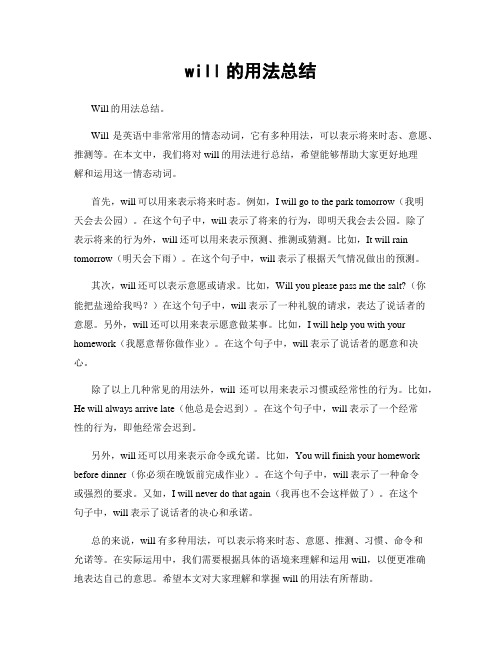2012版七年级下册Module4-一般将来时will的用法
(完整版)will的用法

一要注意will表示的意义和人称要求。
will表示“将来”,常用于一般将来时中,其后跟动词原形;在书面语中,主语是第一人称I / we时,常用shall.在口语中,所有人称均可用will.否定式是will not(缩略式为won’t)。
例如:He will be back in ten minu-tes. 十分钟后他将回来。
I shall/will come to see you this evening. 今晚我将来看你。
They won't go swimming again. 他们将不再去游泳。
【旁白】will 一般用于较正式的文体,而be going to多用于口语中,表示按计划、安排将要发生的事情。
例如:-Where are you going?—I’m going to buy some books。
二要注意will在there be句型中的形式及其句式变换。
由于“一般将来时”的结构可以用“will+动词原形”来表示,所以there be句型的一般将来时的形式就是there will be。
例如:There are many students in our school。
→There will be many students in our school.there will be的句式变换可以用下面的顺口溜来帮你记忆:⑴表示“将来……”很容易, there be换成there will be;⑵若是用于否定句,一定要用there won’t be;⑶要变为一般疑问句,只把will句首提;⑷遇上简答没问题, 用上there will或there won’t就可以。
例如:⑴There is some pollution in our hometown. →There will be some pollution in our hometown.⑵ There will be more cars in ten years。
will的用法总结

will的用法总结Will的用法总结。
Will是英语中非常常用的情态动词,它有多种用法,可以表示将来时态、意愿、推测等。
在本文中,我们将对will的用法进行总结,希望能够帮助大家更好地理解和运用这一情态动词。
首先,will可以用来表示将来时态。
例如,I will go to the park tomorrow(我明天会去公园)。
在这个句子中,will表示了将来的行为,即明天我会去公园。
除了表示将来的行为外,will还可以用来表示预测、推测或猜测。
比如,It will rain tomorrow(明天会下雨)。
在这个句子中,will表示了根据天气情况做出的预测。
其次,will还可以表示意愿或请求。
比如,Will you please pass me the salt?(你能把盐递给我吗?)在这个句子中,will表示了一种礼貌的请求,表达了说话者的意愿。
另外,will还可以用来表示愿意做某事。
比如,I will help you with your homework(我愿意帮你做作业)。
在这个句子中,will表示了说话者的愿意和决心。
除了以上几种常见的用法外,will还可以用来表示习惯或经常性的行为。
比如,He will always arrive late(他总是会迟到)。
在这个句子中,will表示了一个经常性的行为,即他经常会迟到。
另外,will还可以用来表示命令或允诺。
比如,You will finish your homework before dinner(你必须在晚饭前完成作业)。
在这个句子中,will表示了一种命令或强烈的要求。
又如,I will never do that again(我再也不会这样做了)。
在这个句子中,will表示了说话者的决心和承诺。
总的来说,will有多种用法,可以表示将来时态、意愿、推测、习惯、命令和允诺等。
在实际运用中,我们需要根据具体的语境来理解和运用will,以便更准确地表达自己的意思。
一般将来时will的用法

一般将来时是一种常用的英语时态,表达的是将要发生的事情。
使用will可以表示将来时的意义。
以下是一般将来时will的用法:
1. 表示将来要发生的动作或存在的状态。
例如:“I will arrive at 6 o'clock tomorrow morning.”(我将在明天早上6点到达。
)
2. 表示一种意愿、意图或决定。
例如:“He will not come to the meeting.”(他不会参加会议。
)
3. 表示一种预测或假设。
例如:“It will rain tomorrow.”(明天会下雨。
)
4. 表示一种习惯或常规。
例如:“They will have breakfast at 7 o'clock every morning.”(他们每天早上7点吃早餐。
)
5. 表示一种委婉的建议或请求。
例如:“Would you mind closing the window, please?”(请关上窗户好吗?)
需要注意的是,一般将来时并不一定都使用will,有时也会使用其他表达方式,如be going to do、be about to do等。
同时,will 也可以与其他情态动词一起使用,如may、might、should等。
一般将来时will的用法

用will表示承诺和要求
Will也常用来表示承诺和要求。它可以表达你对某件事的承诺,或者向他人提 出请求。例如: I will finish the report by tomorrow. Will you please pass me the salt?
用will表示预测和推测
Will还可以用来表示预测和推测。它可以表达对未来情况的猜测或预测。例如:
用will表示安排和计划
Will也常用来表示安排和计划。它可以表达你将要做某事,并已经安排好了。例如: I will meet you at the airport tomorrow. They will have a meeting at 3 PM.
用will表示习惯和经验
Will还可以用来表示习惯和经验。尽管它是将来时,但在这种情况下表示的是 过去经常发生的动作或情况。例如: When I was young, I will go swimming every weekend. He will always eat lunch at his desk.
在口语中使用will时,有一些常见错误要避免。例如: 错误:I will g o to the park tom orrow. (不要用will来表示明确的计划或安 排。) 正确:I'm g oing to the park tom o rrow.
常见的缩略形式
在口语中,will有一些常见的缩略形式。例如: I'll go to the store later. She won't be able to come tomorrow.
肯定句的构成
在一般将来时的肯定句中,主语后面跟上will动词,然后是动词的原形。例如: I will study for the exam. He will travel to Europe next month.
一般将来时will的用法总结

一般将来时will的用法总结
其基本格式为:sb will do sth;
即:主语+will+动词+时间状语
给举个例子:
I will go swimming tomorrow.
明天我要去游泳
扩展资料
Many local people believe the development will profit them.
当地的许多人认为,这项开发将对他们有利。
This article will form the basis for our discussion.
这篇文章将作为我们讨论的基点。
The cost would be somewhere around 1 500.
费用要在1500英镑上下。
The damage was such that it would cost thousands to repair.
损坏严重,要修好就得花几千块钱。
She knew it would be difficult to undo the damage that had been done
她知道想要消除已经造成的损害是很难的`。
India is one part of the world I would go to at the drop of a hat.
印度是世界上我迫不及待想要去的一个地方。
will表将来的用法

will表将来的用法
1. “Will”可以用来表示将来肯定会发生的事情呀。
比如说,“I will
go to the park tomorrow.” (我明天肯定会去公园。
),就像太阳一定
会升起一样确定。
2. 你知道吗,“will”还能表示决心哦!像“I will study hard from now on.” (我从现在起会努力学习。
),这就像是战士坚定地冲向战场。
3. 嘿,“will”也可以用来表达对他人将来行为的预测呢。
比如“Your sister will love this gift.” (你姐姐肯定会喜欢这个礼物。
),就好像能看到她开心的笑容一样。
4. 哇哦,“will”在询问对方将来的打算时也超有用呀。
“What will you
do this weekend?” (这个周末你会做什么?),这就像打开了一个充满
期待的盒子。
5. 有时候呀,“will”能表示一种承诺。
“I will always be there for you.” (我会永远在你身边。
),这难道不像一座永远可以依靠的山吗?
6. 注意啦,“will”还能表示礼貌地提出请求呢。
“Will you pl ease pass me the salt?” (请你递给我盐好吗?),多亲切呀!
我觉得“will”的用法真的很丰富很实用呢,能帮助我们准确地表达对
将来的各种想法和情况。
will的五种基本用法

will的五种基本用法一、表示将来时will用来表示将来时,这是我们最常见的用法啦。
就像我们计划明天去旅行,我们可以说“I will go on a trip tomorrow.”这就像是在未来的时间长河里,放了一个小小的标记,告诉大家这件事情还没发生,但是会发生。
比如说我小时候,每到暑假前就会特别兴奋,想着“I will have a great summer vacation.”那个时候,这种对未来的期待就满满地包含在will这个词里了。
它就像是一个小信使,带着我们对未来的憧憬和计划,向未来飞奔而去。
而且不管是大事还是小事,都能用will来表达将来。
大到国家说“We will build more high - speed railways in the next five years.”小到个人说“I will eat an ice - cream after dinner.”二、表示意愿will还能表示意愿呢。
这就像是你内心的小声音在说话。
比如有人问你“Can you help me?”你如果很乐意帮忙,就可以说“I will.”这时候的will,就像是你伸出的援手,是你愿意去做某件事情的一种表达。
我记得有一次在公交车上,有个老奶奶站不稳,司机就问有没有人给老奶奶让座。
我当时想都没想就说“I will.”那种感觉就是,内心的善意直接通过will这个词表达出来了。
又好比在学校里,老师问谁愿意参加志愿者活动,那些积极举手的同学心里想的就是“I will.”这是一种积极主动的态度,是我们内心深处对事情的一种接受和向往。
三、表示预测有时候,will也用于表示预测。
就像是我们在看天气的时候说“It will be sunny tomorrow.”这可不是我们能决定的事情,而是根据一些现有的迹象或者经验做出的一种推测。
就像老渔民看了看天和海,就会说“There will be a storm coming.”他们凭借多年的经验,做出这样的预测。
will的用法总结

will的用法总结一、will的基本概念will是英语中最常用的情态动词之一,表示未来时态、意愿、决心和推测等含义。
它的基本形式是will,否定形式为won't,缩写形式为' ll。
二、will的未来时态用法1. 表示将要发生的事情。
例如:I will go to the cinema tomorrow.2. 表示预测或推测将要发生的事情。
例如:It will rain tomorrow.3. 表示意愿或请求。
例如:Will you help me with my homework?4. 表示承诺或威胁。
例如:I will never do it again.三、will的意愿用法1. 表示对未来的期望或希望。
例如:I hope you will come to my party.2. 表示建议或提议。
例如:You will feel better if you take a rest.3. 表示允诺或拒绝请求。
例如:I will lend you some money.四、will的决心用法1. 表示坚定不移的决心。
例如:I will finish this project no matter what happens.2. 表示强烈要求或命令。
例如:You will do as I say.五、will的推测用法1. 表示对现在或过去发生事情的猜测。
例如:He will be late for the meeting.2. 表示对过去发生事情的推测。
例如:He will have arrived in London by now.六、will的注意事项1. 不要把will和shall混淆,shall表示建议或提议。
2. 不要在if从句中使用will,应该用would。
3. 在口语中,will常被缩写为' ll。
七、will的练习题1. 用will填空:a) I _______ be there on time.b) She _______ not come to the party.c) Will you _______ help me with my homework?d) He _______ never forget this experience.2. 改错:a) I will call you when I will arrive.b) If it will rain, we will stay at home.c) He will have finished his work by now.答案:1. a) will; b) will not; c) help; d) will2. a) I will call you when I arrive.b) If it rains, we will stay at home.c) He should have finished his work by now.。
- 1、下载文档前请自行甄别文档内容的完整性,平台不提供额外的编辑、内容补充、找答案等附加服务。
- 2、"仅部分预览"的文档,不可在线预览部分如存在完整性等问题,可反馈申请退款(可完整预览的文档不适用该条件!)。
- 3、如文档侵犯您的权益,请联系客服反馈,我们会尽快为您处理(人工客服工作时间:9:00-18:30)。
Module 4 语法
一般将来时will的用法
一.Be going to 和will的区别
1.be going to主要用于:
①表示_______________________要做的事情.
如:What are you going to do after school? ___________________________________②表示根据前面某种迹象判断某事很有可能发生.
如:Look at the black clouds. It’s going to rain。
___________________________________
2. will主要用于:
①will表示_______________,表示“将要",通常可用____________________。
It’ll soon be Christmas。
很快就到圣诞节了。
②表示不以人的意志为转移的自然发展的未来,如:
He is fourteen this year,and he will be fifteen next year.
_____________________________________
③问对方______________________和表示客气的邀请或命令时,常用will.口语中常用___________代替will。
如:
Will you please open the door?________________________________ Would you like to join us?_________________________________
二.用will表示一般将来时
由will构成的一般将来时,表示_____________________________,其基本结构是:_____________________________
注意:will是情态动词,本身没有的变化。
句式构成:否定句
一般疑问句及肯否回答
特殊疑问句
练习
(1) No one heavy work. 任何人都将不做重活。
(2)Teachers chalk on a blackboard
老师将不会用粉笔在黑板上写字了.
(3)there computers in school?Yes, 。
1
将来学校里会有电脑吗?是的.
(4)What __ ____ life _____ _______ in the future?未来的生活将会是什么样的?
思考:用be going to和will表达的一般将来时侧重点有何不同?
be going to主要用于表达
will主要用于表示
【拓展】你知道一般将来时的标志词有哪些?
____________________________________________________________
____________________________________________________________
三.“There be"句型的一般将来时
1.用be going to 时
肯定句:_________________________________________
[注意]:无论后面加单数名词或复数形式,be都必须用_____。
There is going to be a robot in a family。
否定句:在is/are后面加_______.
There is not going to be robot in a family。
一般疑问句:把______提到_______之前.
Is there going to be a robot in a family?
Yes, there is。
/ No, there isn’t。
2。
用will时
肯定句: _________________________________________
[注意]:无论后面加单数名词或复数形式,be都必须用原形。
There will be only one country。
否定句:在will后面加_____.
There won’t be only one country。
一般疑问句:把______提到_______之前。
Will there be only one country?
Yes, there will。
/ No,there won’t。
练习:
2
用所给词的适当形式填空.
1. Today is a sunny day. We ___________________ (have) a picnic this afternoon。
2。
My brother _______________ (go) to Shanghai next week。
3。
Tom often ______________(go) to school on foot。
But today is rain. He ______________ (go) to school by bike。
4。
What do you usually do at weekends? I usually ________ (watch) TV。
5. It’s Friday today. What _____she _________ (do) this weekend? She ______________ (watch) TV.
6. Mary ____________ (visit) her grandparents tomorrow.
7。
David ______________ (give) a puppet show next Monday.
8。
I ________________ (plan) for my study now.
句子变型
1.Nancy is going to go camping。
(改否定)
Nancy ________ going to go camping.
2. I’m going to get up at 6:30 tomorrow。
(改一般疑问句)
________ _______ ________ to get up at 6:30 tomorrow?
3. We will meet at the bus stop at 10:30。
(改一般疑问句)
_______ ________ meet at the bus stop at 10:30。
4. She is going to listen to music after school。
(对划线部分提问)
________ _______ she ________ ________ _________ after school?
5。
My father and mother are going to see a play the day after tomorrow.(同上)
_________ _________ going to see a play the day after tomorrow.
1.我打算明天和朋友去野炊。
I_____ _______ _________ have a picnic with my friends.
I ________ have a picnic with my friends.
2. 下个星期一你打算去干嘛?我想去打篮球.
What ________ ________ _________ _________ _________ next Monday?
I _______ ______ _____ play basketball。
What _________ you do next Monday?
I ________ play basketball。
3。
你妈妈这个周末去购物吗?是,她要去买一些水果。
_____ your mother _______ ________ go shopping this ___________?
3
Yes, she _________. She ______ ________ __________ buy some fruit.
4。
你们打算什么时候见面。
What time _______ you _________ __________ meet?
4。
